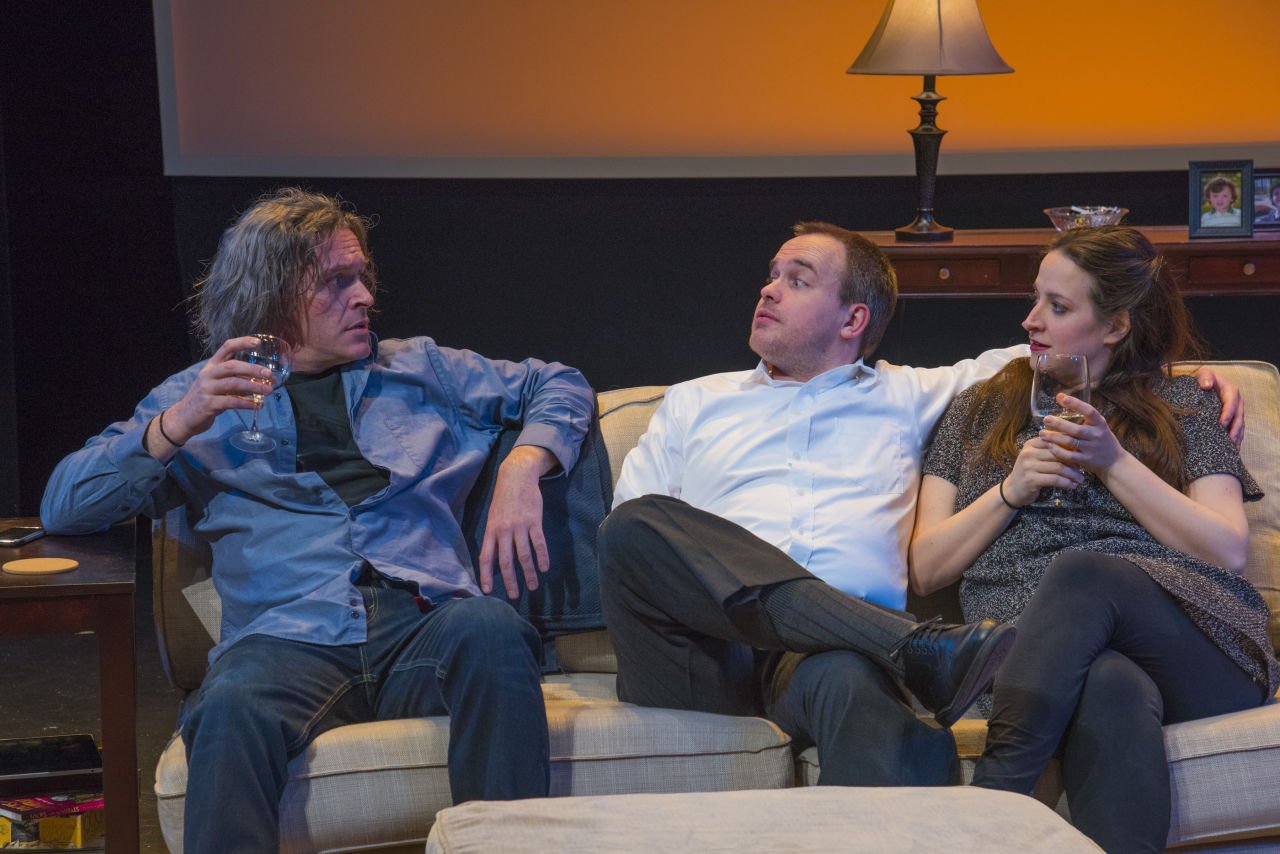“Every work stands on its own, and Scenes From An Adultery is sharper, edgier, more free-wheeling than Noone’s recent other world premiere, The Second Girl at the Huntington Theatre, or past pieces such as Brendan.”
–Rich Fahy, OnBostonStages


The Story
Local playwright Ronan Noone takes the traditional British drawing room comedy of manners and turns it on its side in the hilariously bawdy new play, Scenes From An Adultery.
During one of their weekly sessions at the local pub, Gasper spills the news to Tony that a mutual friend might be having an affair. Tony’s wife Lisa is caught up in it but doesn’t know, Gasper’s on the case, and all Tony wants is to forget it all happened.
The play examines our unions and what it takes for them to endure in this culture clash comedy of miscommunication, miscalculations, and the boundaries of true love and friendship.
PRODUCTION INFORMATION
Directed by: Bridget Kathleen O'Leary
Produced by New Repertory Theatre, Boston
Cast: Ciaran Crawford (Gasper), Peter Stray (Tony), Leda Uberbacher (Lisa)
Unpublished
Playwright Ronan Noone on Scenes From An Adultery
Some Nice Things People Said
“That way, as Shakespeare says, the play’s the thing — in this case a small thing but keenly observed and skillfully exaggerated, with bright, thin veneers of both social commentary and schadenfreude.”
— Carolyn Clay,
Boston Arts Diary
A witty knot of a play about fidelity in friendship and marriage.
Gasper (Ciaran Crawford) has seen the wife of a mutual friend of his and Tony’s (Peter Stray) in the presence of another man and begins a series of questionings and murmurings that have endless repercussions for his friendship with Tony and for Tony’s marriage to Lisa (Leda Uberbacher).
This tightly wound, cleverly constructed black comedy makes its curiously dramatic hay out of almost nothing. One friend mentions something to another and the gears begin to spin. Who said what to whom and when he or she said it takes on supreme importance in this intriguing play of innuendo, suspicion and sly revelation. Its avowal that friendship is proven through a bestowal of confidences is upended when the demand of greater marital openness trumps the hidden confessions given in a lubricated state from one friend to another at a pub.
All of these turns of confidence and betrayal hit into one another like billiard balls, forcing the succeeding effects to careen elsewhere and produce, in the end, unforeseen consequences. Like the proverbial butterfly beating its wings on one side of the world and causing storms to swirl on the other, the seemingly innocent gesture of voice travels through psychological distance to produce maelstroms on the other side of the social landscape, totally unexpected, and orders of magnitude greater in force than the original probing remark.
With an Irish musicality in its characters’ voices, Scenes from an Adultery comes across as a kind of intricate chamber music of barbs and innuendos. Like Mamet’s plays, this one is full of cursing, and, like much of Mamet, delivered in the interest in dovetailing intricate plot, potent character and rippling diatribe. Born in Ireland but now a resident of this country, Noone comes to this musicality naturally. We saw some of it in his recent outing at the Huntington, The Second Girl, but, given the totally different context, in a much more cautiously restrained way.
Beginning with a wisp and ending in a torrent, playwright Noone keeps the tension building and fills it with increasingly temperamental dialogue, couching, in the progressively vicious repartee, a couple of great speeches. The players, all new to the New Rep, do an admirable job.
As Gasper, Ciaran Crawford exudes a perfect combination of sleazy charms, and, in his culminating jab at Tony (played with convincingly schlubby intensity by Peter Stray), gets to stick the knife in and turn with a kind of oleaginous glee. The writing in that denouement is brilliantly tragic and Crawford makes it particularly compelling in its casual callousness.
In his final gasp towards hope at the very end, Stray’s Tony gives the turn to a single name that speaks volumes. Conveying with an unwitting vulnerability the desperation of having his world spin out of control, Stray finally makes Tony into a sympathetic anti-hero. Initially we scorn him, but ultimately his pain feels close to home, quite an accomplishment for playwright, director and actor.
As Lisa, Leda Uberbacher fills in the spaces with appropriate doses of ordinariness and outrage, finally concocting a brew that goes right to the head, daunting and forceful.
The play is short, without intermission and potent with tragicomedy, not allowing one to come up for breath until all the ropes have been crossed and the endless knots have been tied.
View original article here.